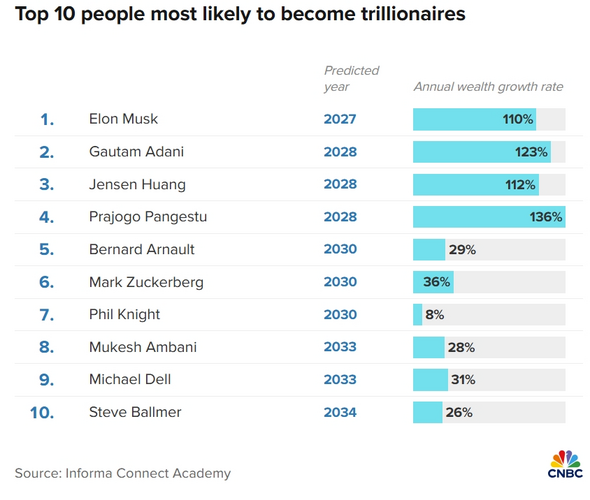The Race to Trillionaire: Elon Musk and Wealth Surge
Explore the unprecedented rise of trillionaires like Elon Musk and their potential impact on wealth, society, and the future of finance.

Key Points
- Elon Musk
is projected to become the world's first trillionaire by 2027, driven by his significant wealth growth from Tesla and
SpaceX.
- Other billionaires like Gautam Adani
and
Jensen Huangare also on track to reach trillionaire status by 2028, showcasing the rapid accumulation of wealth.
- The rise of trillionaires raises important questions about wealth distribution, economic inequality, and the responsibilities that come with immense financial power.
The Rise of the Trillionaires: A Glimpse into the Future of Wealth
The world is on the brink of an unprecedented financial milestone, where individuals may soon hold fortunes exceeding one trillion dollars. The prospect of a 'trillionaire' has sparked significant interest, with predictions indicating that Elon Musk may be the first to achieve this status by 2027. This exciting possibility calls into question the implications of such wealth and who might follow in Musk's footsteps.
Elon Musk: The Front-Runner
According to a recent report by Informa Connect Academy, Musk's wealth is projected to grow at an astonishing average rate of 110% annually. As of September 2024, his net worth stands at around $251 billion and is expected to skyrocket as his ventures, particularly Tesla and SpaceX, continue to prosper. Musk’s array of successful enterprises not only demonstrates his financial acumen but also illustrates how innovation can lead to unparalleled wealth.

Emerging Rivals for Trillionaire Status
While Musk appears to be the leading candidate for the title of first trillionaire, he is not alone in this race. Other billionaires are also rapidly advancing towards this remarkable financial summit. Gautam Adani, founder of the
in India, is projected to achieve trillionaire status by 2028, with an impressive average wealth growth rate of 123% per year. Jensen Huang, CEO of
, and
, an Indonesian energy tycoon, are also anticipated to cross the trillion-dollar threshold in the same year.
It’s fascinating to observe this new generation of billionaires leveraging technological advancements to create and amplify their wealth. For instance, Huang's profound success with Nvidia, a leader in artificial intelligence (AI) and high-performance computing, showcases the transformative power of technology in generating wealth. As more businesses innovate and adapt to emerging technologies, the potential for wealth creation skyrockets.

The Economic Implications of Rising Trillionaires
The implications of these billionaires reaching such unprecedented financial heights extend beyond individual achievements. The emergence of trillionaires raises critical questions about wealth distribution, economic inequality, and tax policies. Could societies see greater disparities in wealth, or will these individuals use their resources to benefit a broader range of people through philanthropy and investment in public goods?
Interestingly, while the world focuses on these potential trillionaires, we should also consider the historical context. For example,
was celebrated as the first billionaire in 1916, fundamentally changing the dynamics of wealth and capitalism. In just over a century, the evolution towards trillionaires highlights an acceleration of wealth accumulation in our society, driven largely by technological advancements.
A New Era of Wealth Management
With wealth creation reaching new heights, the financial landscape is evolving. Future trillionaires must navigate not only investments but also corporate sustainability, social responsibility, and ethical governance. As the race for financial supremacy intensifies, the responsibilities accompanying such immense wealth will become increasingly critical.
The challenge for these wealthy individuals lies not just in maintaining their status but in utilizing their wealth to foster innovative solutions to pressing global issues. The productivity of their ventures and the impact they can have on society will define this new era of wealth.
Diving into the realm of trillionaires opens up engaging discussions about the future of wealth, how it is generated, and its potential impacts. As we anticipate the arrival of the world's first trillionaire, the stakes are high, not just for the individuals involved, but for society as a whole. The trajectory of wealth creation and its implications will be crucial as we navigate this new landscape.
As we look ahead, it’s clear that the rise of trillionaires is not merely a financial phenomenon; it encapsulates the rapid evolution of our economic systems and societal structures. The journey ahead poses both a challenge and an opportunity for future generations to redefine the meaning and purpose of wealth.


